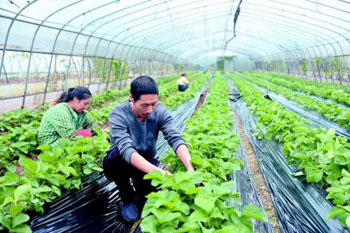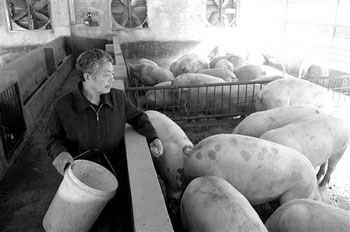Master Lai planted strawberries with soilless planting and organic fertilizer.

Lai Shiyong (previous) and workers are covering strawberries to keep warm.
The direct result of long-term use of chemical fertilizer to grow crops is soil consolidation, an increase in diseases and insect pests, and crops are prone to "difficult and miscellaneous diseases" such as root rot. How can we maintain soil fertility and restore health at the same time? Let the tired land catch its breath? This newspaper has sent a series of articles to introduce the methods of improving soil. This article introduces soilless cultivation, hoping to give some reference to farmers.
Recently, Lai Shiyong, head of Guangyuan Jinol Ecological Agriculture Co., Ltd., who has been engaged in strawberry cultivation and dealing with agricultural science and technology for nearly 10 years, revealed to the author his planting knack: soilless cultivation gradually replaced soil cultivation, organic fertilizer replaced inorganic fertilizer, to ensure that the soil is healthier and the strawberries produced taste better.
Soilless cultivation competes which kind of soilless cultivation is more cost-effective
In 2009, after returning from the Chinese Academy of Agricultural Sciences, Lai Shiyong came up with a set of organic ecological soilless cultivation method. "popularly understood, soilless cultivation means that crops do not need to be in direct contact with the soil, but only grow in the 'substrate'." He said that the "matrix" is made of slag, sand and farm manure after composting. The specific approach is to set up a bed about 30 centimeters wide in the plot, build it with bricks on all sides, and then use plastic film to separate crops from the soil, allowing strawberries and other crops to grow freely in organic fertilizer covered with plastic film.
"the most important thing is to increase the yield per unit area of crops, improve their quality and gain greater market prospects." When it comes to the advantages of soilless cultivation, Lai Shiyong is like a few treasures: first, ecological fertilizer conservation, no chemical fertilizer, all the fertility is concentrated in the bed. The second is to prevent diseases and avoid harm, crops do not come into direct contact with the soil to avoid diseases and insect infections. The third is to save labor and time. The fourth is to save water. Fifth, high yield and income. Taking soilless cultivation of greenhouse strawberries as an example, the yield per mu can reach more than 3000 jin, which is about 1000 jin higher than that of soilless cultivation, and the income can be increased by nearly 10,000 yuan.
Today, Lai Shiyong's agricultural park soilless cultivation of strawberries and soil cultivation of strawberries occupy half of the country. "although the cost of one-time investment in soilless cultivation of strawberries is higher in the early stage, in the long run, a well-built bed can be maintained for seven or eight years, and only a small amount of organic fertilizer needs to be renewed every year, which is very economical." Lai Shiyong said.
Organic fertilizer replaces inorganic fertilizer and beneficial bacteria win.
"the use of organic fertilizers not only allows crops to absorb more beneficial bacteria, but also allows soil that has been dependent on chemical fertilizers for many years to recuperate." Lai Shiyong said, for example, when tomatoes received chemical fertilizer nutrients in the early days, they were very prosperous, and when they hung up the fruit, they would fall off ahead of time because of root rot, canker, and so on, so that growers would lose all their previous efforts.
"Organic fertilizer can not only provide comprehensive nutrition for crops, but also has a long fertilizer effect, increase and renew soil organic matter, promote microbial reproduction, improve soil physical and chemical properties and biological activity, and provide main nutrients for the growth of green food." Lai Shiyong said that traditional farm manure will contain weeds, eggs and other harmful substances, directly applied in the field is not conducive to the growth of crops. Bio-organic fertilizer is a kind of fertilizer which compost, harmless treatment and completely mature, which has the effect of both microbial fertilizer and organic fertilizer. This kind of biological fertilizer is different from the traditional farm manure, and the mortality rate of eggs after treatment is more than 95%. It is not only odorless and non-toxic, but also has the advantages of high efficiency, long-lasting and disease resistance.
In the next step, Lai Shiyong will also interplant vine crops such as towel gourd and balsam pear in the strawberry greenhouse, with an estimated income of 4000 to 5000 yuan per mu. According to this calculation, his 40 mu vegetable greenhouse is expected to earn millions of yuan a year.
- Prev

Do not forget to make good tea-- "slow" and "fast" on the way to starting a business
Do not forget to make good tea-- "slow" and "fast" on the way to starting a business
- Next

An annual output of nearly 8000 pigs in a four-story building on one mu of land
An annual output of nearly 8000 pigs in a four-story building on one mu of land
Related
- A course of planting techniques and methods on how to grow carrots
- How to plant the latest tulips?
- Is it better to pick tea in the morning or in the afternoon? When is the best time for tea to be picked? what is the third or fifth tea?
- Launch Yuanxiao Happy combination Haocha + Tea Yuan healthy Taste
- Penghu Tourism "Fireworks 20 Parade with You"
- 2022 West Lake Happiness holds "Digital Revitalization Voucher" and draws iphone13 and laptop.
- Banqiao Fuzhou social houses are designed to change start-up combined with police elimination to create a safe and livable environment
- The convenient measure of "mechanical weeding" in Xinbei has been abused and the Agriculture Bureau has imposed heavy penalties on the illegal land consolidation.
- Changgeng University Joins Hands with Four Memory Factories to Rescue Memory Talent Shortage
- The list of Taiwan's top 100 MVP managers is listed by the Director-General of the Farmers' Association of Sanxia District.

